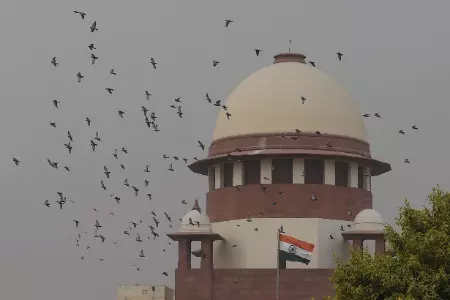Apex Court: No one-size-fits-all rule for punishing lawmakers

New Delhi: The Supreme Court on Tuesday outlined key principles for courts to consider when reviewing actions taken by legislatures against their members. A bench comprising Justices Surya Kant and N Kotiswar Singh noted that assessing whether a measure was excessive required careful examination of the unique facts of each case.
“Determining what constitutes a disproportionate measure is inherently complex and subjective. Courts must engage in a nuanced scrutiny of the specific circumstances surrounding each case,” the bench observed.
The top court held that the one-size-fits-all definition for adjudicating proportionality in such matters was impractical and urged courts to exercise discretion judiciously.
These observations were made in a case concerning RJD MLC Sunil Kumar Singh, who was expelled from the Bihar Legislative Council (BLC) for sloganeering against Chief Minister Nitish Kumar. The court set aside Singh’s expulsion, calling it excessive while disapproving of his conduct.
In its judgment, the bench provided a framework to assess whether a legislative action against a member was justified. Key parameters include the extent to which the member’s actions disrupted the house proceedings and whether their behavior damaged the dignity of the institution.
Other factors outlined include the member’s past conduct, whether they showed remorse, their cooperation with any inquiry, and whether less severe disciplinary measures were available. The court also highlighted the importance of assessing whether statements made by the member were intentional or simply a reflection of local dialect influences.
“A careful examination of these factors will ensure that legislative actions remain justified, necessary, and balanced. This protects the integrity of the legislative body while safeguarding the rights of its members and serving the larger societal interest,” the bench stated.
The court stressed that legislative punishment should not be wielded as a tool for retribution but rather as a means to uphold discipline within the house. “The primary objective should be to maintain decorum and foster an environment conducive to constructive debate. Any punitive action must be fair, reasonable, and follow due process, ensuring it does not unduly restrict democratic participation,” it added.
Singh, known for his proximity to RJD chief Lalu Prasad and his family, was expelled from the BLC on July 26, 2024, following his disruptive behavior during a session on February 13, 2024. He was accused of sloganeering against the chief minister, mimicking his body language, and challenging the ethics committee’s authority after appearing before it.



